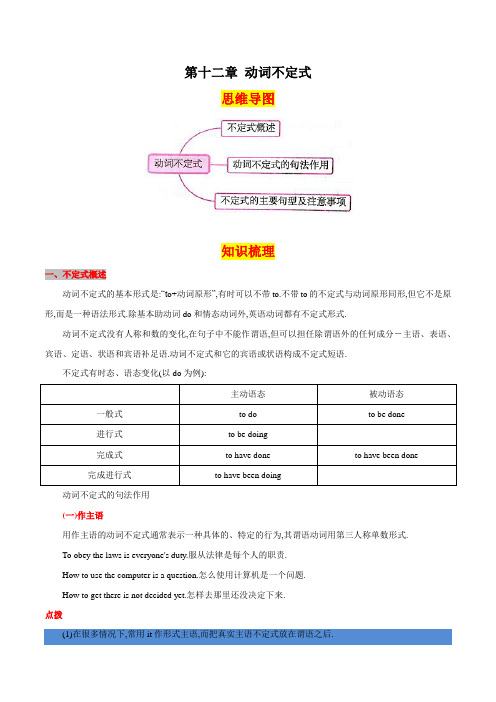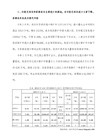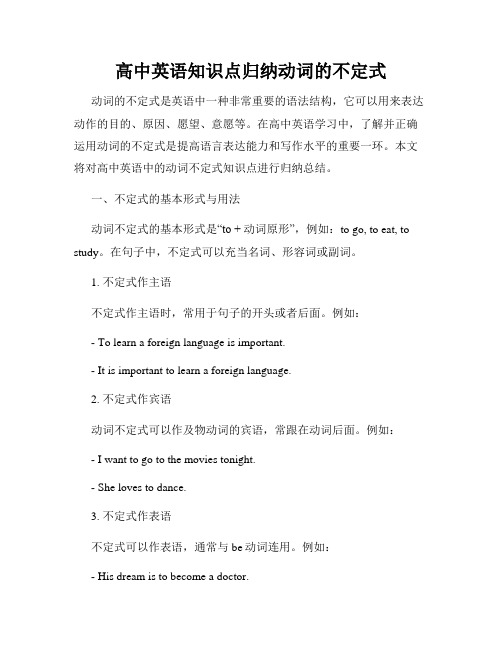英语语法-动词不定式
第十二章动词不定式(思维导图+知识梳理+好题精炼)2022-2023初中英语中考语法归纳

第十二章动词不定式思维导图知识梳理一、不定式概述动词不定式的基本形式是:“t o+动词原形”,有时可以不带to.不带to的不定式与动词原形同形,但它不是原形,而是一种语法形式.除基本助动词do和情态动词外,英语动词都有不定式形式.动词不定式没有人称和数的变化,在句子中不能作谓语,但可以担任除谓语外的任何成分-主语、表语、宾语、定语、状语和宾语补足语.动词不定式和它的宾语或状语构成不定式短语.不定式有时态、语态变化(以do为例):动词不定式的句法作用(一)作主语用作主语的动词不定式通常表示一种具体的、特定的行为,其谓语动词用第三人称单数形式.To obey the laws is everyone's duty.服从法律是每个人的职责.How to use the computer is a question.怎么使用计算机是一个问题.How to get there is not decided yet.怎样去那里还没决定下来.点拨(1)在很多情况下,常用it作形式主语,而把真实主语不定式放在谓语之后.It was difficult to sell my car.我的车很难卖掉.It's not known where to stay for the night.在哪里过夜还不知道.(2)如果要表示不定式的动作是谁做的,一般在不定式前加一个for短语.It will be a regret for us not to help him.我们没有帮助他是个遗憾.(3)在某些形容词(如kind, good, nice, wise, unwise, clever, silly, wrong, right, foolish, stupid, careless, considerate, rude, naughty, impolite等)作表语时,不定式前常可加一个以of引起的短语,来说明不定式指的是谁的情况.It would be rude of us to refuse their invitation.(我们)拒绝他们的邀请,会显得无礼.(二)作表语作表语,一般紧跟在系动词,如:be, seem, get等后面,用以说明主语.The question is when to start.问题是什么时候启程.You seem to have lost weight.你好像减肥了.What we have to do first is to find a solution.我们得做的第一件事是找出一个解决办法.点拨当不定式所作的表语仅用来说明主语的内容时,这个不定式只作单纯的表语,而不具有未来的含义.(三)作宾语能以不定式作宾语的动词很多,常见的有:agree, begin, decide, expect, forget, hope, learn, like, manage, pretend, start, try, want, wish等.Do you wish to see the manager?你想见经理吗?They decided to learn English hard.他们决定好好学英语.Don't forget to meet me at 6:00.别忘了六点钟和我见面.有些动词,如:tell, advise, show, teach, know, forget, learn , remember, show,understand, see, wonder, hear, find out, explain, decide, discuss等后面,常用带疑问词的不定式作宾语.We don't know who(whom)to ask.我们不知道问谁.We asked how to get to the station.我们问怎么到达车站.Have you decided where to go for your holidays?你们决定到哪儿度假了吗?I don't know whether to apply for the job or not?那份工作我不知道申请还是不申请?(四)作定语I have no time to waste.我没有时间可浪费.Let me find a place to park.我来找个停车的地方.He is always the first to come to work and the last to leave.他总是第一个来上班,最后一个走.点拨不定式修饰something, anything, nothing时,放在它们的后面.如果something, anything, nothing 有形容词来修饰,词序是something(nothing...)+形容词+不定式.My father had something to do.我父亲有事要办.Have you got anything important to buy?你有什么重要的东西要买吗?(五)作状语不定式常可用作状语,修饰动词,表示行为的目的、结果、原因等.一般放在被修饰词之后,但在表示目的时,为了强调也可放在句首.1.作目的状语为加强语气在否定式前还可加上in order或so as组成词组(即:in order to...,so as to...),作状语表示目的.To live a long and healthy life, we must learn to have a balanced diet.为了能过长寿而健康的生活,我们必须懂得吃均衡的食品.I stayed there so as to see what would happen.我留在那儿,为的是想看看会发生什么事.In order to help him, we would do everything we can.为了帮助他,我们愿意尽一切力量.2.作结果状语表结果,其逻辑主语通常亦是全句的主语.在“so...as to...”“such...as to..“enough to...”“only to...”以及“too...to...”等结构中的不定式皆表示结果.She is old enough to go to school.她已到了可以上学的年龄了.He was too drunk to drive home.他酩酊大醉,没法开车回家.3.作原因状语She trembled to think of the terrible accident.想到那可怕的车祸,她就不寒而栗.We jumped with joy to hear the news.听到这消息,我们都高兴地跳了起来.(六)宾语补足语1、有很多动词的后面都可以有不定式作宾语补足语常见的这类动词有:advise, ask, tell, help, wish, want, expect, forbid, persuade, press, request, teach, warn等.She asked her grandfather to play game with her.她请爷爷跟她一起做游戏.Mother told me to cook the meal.妈妈叫我做饭.2.有一些动词后用作宾语补足语的不定式通常不带to,这种动词有两类:一类是感觉动词,另一类是使役动词感觉动词:如feel, see, hear, watch, notice等.使役动词:如make, let, have等.Let me do it for you.让我来替你做.Don't let her go out.别让她出去.I made him work hard.我迫使他加劲干.(1)动词help之后,复合宾语中的不定式可带to,亦可不带to.在上述动词转换为被动结构时,其后的不定式必须带to.He was seen to enter the theatre.有人看见他走进了剧院.I was made to do my homework the whole night.我被迫整晚做作业.Can you help me (to) move this table?你能帮我移动一下这张桌子吗?(2)感官动词的宾语补足语有两种形式:不带to的不定式和动词-ing形式.I heard Meimei singing in her room when I went past.我路过的时候听见梅梅在房间里唱歌.(路过的瞬间正在唱,所以用singing)We often hear Meimei sing in her room.我们经常听见梅梅在房间里唱歌.(经常听见,用不定式)I saw him come in.I saw him coming in.两句话的意思都一样:我看见他进来.用不定式着重于动作的全过程,用动词-ing形式则是强调当时动作的进行情况.3.当谓语动词为think, make, find, consider, feel, regard等词,作宾语的不定式后面有宾语补足语时,常用it作形式宾语,而将真正的宾语放在补足语的后面I find it easy to learn English well.我发现要把英语学好很容易.三、不定式的主要句型及注意事项(一)不定式的否定式不定式的否定式:not+不定式,经常和ask(tell)sb. to do sth.句型连用.She asked me not to drive him to the station.她要我不要开车送他到车站.Try not to be late.争取不要迟到.Mary asked me not to give my pen to Jimmy.玛丽让我别把笔给吉米.She decided not to come here again.她决定不再到这儿来.点拨不定式的否定式和否定句的区别:I asked him not to open the door.我让他别把门打开.I didn't ask him to open the door.我没让他把门打开.(二)不定式的进行时态进行式:表示在谓语动词所表示的动作或状态发生时正在进行.It's nice to be sitting here with you.在这儿陪你坐着是非常愉快的.It is unwise for him to be talking that topic all the time.他老是谈论这件事,很不明智.(三)不定式的完成时态完成式表示在谓语动词的动作或状态发生时已经完成.She said she was sorry to have missed you.她说她没见到你很遗憾.He seemed to have visited our factory.他好像参观过我们的工厂.They appeared to have met before.他们看来以前见过面.(四)动词不定式的被动语态表示被动意义I didn't want to be told about it.我不想被告知这件事.Nothing seems to have been forgotten.似乎什么也没有被遗忘.The building is said to have been destroyed in a fire two years ago.据说这幢大楼两年前已毁于一场大火.在以某些形容词,如kind, good, silly, honest, bad, stupid, bold, clever, cruel,courteous, nice, rude, sensible, tactful, wise, wrong等作表语时,后面需用以“of+名词(或代词宾格)+不定式”结构,以说明不定式所表示的动作的执行者是谁(即of短语是不定式的逻辑主语).It's very good of you to come.谢谢你的光临.How silly of you (it is)to make such a mistake!你出了这样的差错,多傻啊!It's very kind of you to say so.多谢你这么说.在had better, had best, would rather, would rather...than, would sooner, would sooner...than, cannot but, do nothing but等结构后面的不定式要省略“to”.You had better write it in English.你最好用英文写.I would rather stay at home.我宁愿待在家里.好题精练一、用-ing形式或不定式的适当形式完成句子1.Do you enjoy_________ football?(play)2.Fred didn't have any money, so he decided_________ a job.(take)3.We're going out for dinner, Would you like_________ us?(join)4.The teacher reminded the students_________ their test paper on time.(finish)5.When I was tired, I enjoyed_________ TV.(watch)6.It was a nice day, so the old man agreed_________ for a walk.(go)7.I'm not in a hurry, I don't mind_________.(wait)答案:1.playing2.to take3.to join4.to finish5.watching6.to go7.waiting二、选择括号内所给词组完成句子,注意括号内“go+v.-ing形式”构成固定搭配的用法(go boating; go fishing; go dancing; go running; go skating; go hunting; go singing)1.She's a good dancer. She always_________ on Saturday.2.I've got a gun. I'll_________ with that strong hunter next weekend.3.“Where is Tim?”“He has. _________ He always runs in the morning.”4.We have enough fish to eat. Our father_________ every day.答案:1.goes dancing2.go hunting3.gone running4.goes fishing三、仿照示例改写下列句子示例:It is very interesting to play baseball.→ To play baseball is very interesting.1.lt was not polite to speak that way before Mr. Lee.____________________________________________________________________________________________ 2.It can be quite easy to travel by air.____________________________________________________________________________________________ 3.lt will be no problem to arrive there before noon.____________________________________________________________________________________________4.To make those strangers believe us was so difficult.____________________________________________________________________________________________ 5.To help Tom speak Chinese well is not at all easy.____________________________________________________________________________________________ 答案:1.To speak that way before Mr. Lee was not polite.2.To travel by air can be quite easy.3.To arrive there before noon will be no problem.4.It was so difficult to make those strangers believe us.5.It is not at all easy to help Tom (to) speak Chinese well.四、选择填空1. _________ the bookstore, he stopped_________ a few books.A. Passing; buyingB. Passing; to buyC. To pass; buyingD. Having passed; to buy2.Bruce,look at your dirty shoes, You'd better_________ them right now.A. washedB. washingC. washD. to wash3. _________ the room, I found the computer_________.A. Entering; stealingB. Entering; stolenC. To enter; stealD. To enter; stealing4.We've worked hard for nearly one hour. Let's stop_________ a rest now.A. haveB. to haveC. havingD. have had5.My mother always tells me not_________ to the net bars(网吧).A. goB. to goC. goesD. going6.The teacher asked us_________ English for half an hour in the morning.A. reads B reading C. to read D. read7.You will have to get up early tomorrow. Stop_________ TV, Peter.A. watchesB. watchC. to watchD. watching8.I find it hard_________ English well.A. learnB. learningC. to learnD. learns9.The teacher asked John_________ a short talk in our class meeting.A. giveB. to giveC. gaveD. giving10.The girl was too poor_________ a houseA. to buy; to live inB. to buy ;to liveC. buy; to liveD. buying; living in11.It was very late at night, but Mr. Brown still went on_________.A. works B .worked C. working D. work12.Remember_________ him about it before he goes away.A. tellB. to tellC. tellingD. to telling13.Lin Tao is strong enough_________ the big box.A. carryB. to carryC. carryingD. carries14.Her mother told her_________ in bed.A. not readB. not to readC. don't readD. to not read15.When class began, we stopped_________ to the teacher carefully.A. listeningB. listenC. listens D .to listen16.You'd better_________ the cinema by bus.A. don't goB. to goC. to go toD. go to17.What did the manager_________ you to_________ at the meeting?A. tell; sayB. ask; speakC. tell; speakD. ask; talk18.Tom was let_________ in the gate house.A. waitB. to waitC. waitingD. to have waited19.Mr.Hu has enough time_________ the job in two days.A. finishB. to finishC. finishingD. finished20.Look,the building_________ is our library.A. is repairedB. being repairedC. repairingD. to be repairing21. _________ no money, I could not buy this coat.A. HaveB. HavingC. To haveD. Have had22.The teacher has something important_________ us.A. to tellB. tellsC. tellingD. told23.Li Ming didn't know_________ next.A. to do whatB. what to doC. how to doD. what do24.I'd love_________ to your birthday party.A. comeB. cameC. to comeD. comes25.It took me two hours_________ by bus.A. to get thereB. to get to thereC. get thereD. get to there答案:1-5BCBBB 6-10CDCBA11-15CBBBD 16-20DABBB21-25 BABCA五、改正下列句子的错误1.He seems to not hear from her.____________________________________________________________________________________________ 2.I hope see you soon.____________________________________________________________________________________________ 3.I made them to give the money back.____________________________________________________________________________________________ 4.The scientist gave us some advice on how learning English.____________________________________________________________________________________________ 5.No one noticed him to leave the room.____________________________________________________________________________________________ 6.Have you given up to smoke?____________________________________________________________________________________________ 7.We found him waited at the school gate.____________________________________________________________________________________________ 8.Why not to turn off the light?____________________________________________________________________________________________ 9.She didn't want me go.____________________________________________________________________________________________ 10.I don't know to swim.____________________________________________________________________________________________ 11.China is a developed country belonging to the third world.____________________________________________________________________________________________ 12.It's getting dark. We have to find a hotel to live.____________________________________________________________________________________________ 13.He said he had an important meeting to attended.____________________________________________________________________________________________ 14.They don't allow that people smoke.____________________________________________________________________________________________ 15.It's difficult sell my car.____________________________________________________________________________________________ 答案:1.He seems not to...2.I hope to see...3.I made them give...4....how to learn...5....him leave...6....given up smoking?7...him waiting...8.Why not turn off...9.She didn't want me to go.10.I don't know how to swim.11....a developing...12....to live in13....to attend.14. ...people to smoke.15...to sell my car.。
英语语法之动词不定式

动词不定式语态
注意:1) 其他系动词如,look,appear等也可用于此句型 2) 不定式作为句子成分时,动词用单数形式。 3) 当不定式作主语的句子中又有一个不定式作表语时,不能用It is… to…的句型 (对)To see is to believe. 百闻不如一见。 (错)It is to believe to see.
动词不定式时态
1) 现在时:一般现在时表示的动词,有时与谓语动词表示的动作同时发生,有时发生在谓语动词的动作之后。 He seems to know this. I hope to see you again. = I hope that I'll see you again. 我希望再见到你。
注意:疑问词带不定式在句中作成分时,谓语动词用单数。 TБайду номын сангаасe question is how to put it into practice. 问题是怎样把它付诸实施。
3)当复合宾语中的宾语是不定式时,先用形式宾语it代替不定式,把不定式置于补语之后,即:主语+动 词+it+补语+to do句式。如: We think it quite important for us to learn a foreignlanguage well. He feels it his duty to help the poor. I find it difficult to learn English well.
动词不定式用法

动词不定式用法动词不定式是英语中的一种常见的动词形式,它被用来表示目的、意图、能力、愿望或建议等。
动词不定式通常由“to”和动词原形组成,如“to write”、“to read”、“to learn”等。
动词不定式在句子中可以作为主语、宾语、表语、定语或补语等。
一、作为主语动词不定式可以作为主语,通常用于形式主语的结构中,例如:To learn English is important for me.(学习英语对我来说很重要。
)To study hard is the key to success.(努力学习是成功的关键。
)To travel is my dream.(旅行是我的梦想。
)二、作为宾语1.作及物动词的宾语动词不定式可以作为及物动词的宾语,例如:I want to learn English.(我想学英语。
)She decided to go to Beijing.(她决定去北京。
)They plan to visit Paris next year.(他们计划明年去巴黎。
)2.作介词的宾语动词不定式可以作为介词的宾语,通常介词为“for”、“of”、“about”、“to”等,例如:She is good at singing and dancing.(她擅长唱歌和跳舞。
)3.作动词或动词词组的宾语动词不定式可以作为某些动词或动词词组的宾语,例如:He hopes to become a doctor in the future.(他希望将来成为一名医生。
)I expect to see you soon.(我期望很快能见到你。
)三、作为定语动词不定式可以作为定语,修饰一个名词或代词,例如:I need a book to read.(我需要一本书来读。
)This is a good place to live.(这是一个适合居住的好地方。
)He has a lot of work to do.(他有很多工作要做。
语法规则-动词不定式

语法规则-动词不定式学习必备欢迎下载(一) 动词不定式做状语时表示目的和结果用法总结1. 作目的状语: I came here to see you. To stop the train, pull the lever downwards.目的状语还可以用如下表达法:肯定:to in order to+ 动词原形so as toI come to see her. = I come in order to see her. = I come so as to see her.that so that+ 主语 + may/might + 动词原形in order thatI come that I may see her. = I come in order that I may see her. = I come so that I may see her.否定: not to in order not to so as not to+ 动词原形that so that+ 主语 + may/might + not + 动词原形in order thatHe went away not to see me.= He went away in order not to see me.= He went away so as not to see me.= He went away in order that he might not see me.= He went away that he might not see me.= He went away so that he might not see me.in order to, in order that 和 so as to, so that 的区别 in order to 可以用在句首或句末,但 so as to 只能用在句末。
如:He got up very early in order to/so as to catch the first bus. In order to catch the first bus, he got up very early.(此时不能用so as to) so as to 和 in order to 的汉语意思应该是一样的“为的是,为了”。
英语语法-动词不定式的特征

英语语法-动词不定式的特征1、不定式可以有动词的特征,即不定式有时态和语态的变化:①一般式:不定式的一般式所表示的动作与限定动词动作同时发生或发生在限定动词动作之后。
I'm glad to meet you.很高兴见到你。
(glad与meet两个动作同时发生)He seems to know a lot.他好像知道很多。
(seem与know两个动作同时发生)He wants to be an artist.他想做一名艺术家。
(to be an artist这个动作发生在want之后)②进行式:不定式的进行式所表示的动作与限定动词动作同时发生。
The boy pretended to be working hard.男孩假装正在努力工作。
They seem to be discussing problems in the room.他们好像在房间里讨论问题。
③完成式:不定式的完成式表示的动作发生在限定动词动作之前。
I regretted to have told the truth.我后悔说实话了。
(to have told发生在regret之前)I happened to have seen the film.我碰巧看过这部电影。
(to have seen发生在happen之前)④被动式:To be obeyed was natural to her.她天性要别人听命于她。
The book is intended to be read and not to be torn. 这书是供人阅读而不是供人撕毁的。
2、不定式也有名词性质不定式的名词性质表现在:在句中可作主语、宾语等。
To be content with little is true happiness.知足常乐。
(做主语)The man,without fuss,agreed to serve as witness.这个人没有异议,同意作证人。
英语语法总结--动词不定式

Wedidn'texpecttheretobesomanypeoplethere.我们没料到会有那么多人在哪里。注意:有些动词需用as短语做补语,如regard,thinkbelieve,take,consider. WeregardTomasourbestteacher. 我们认为汤姆是我们最好的老师。 Marytookhimasherfather. 玛丽把他当作自己的父亲。
9省to的动词不定式
1)情态动词(除ought外,oughtto):2)使役动词let,have,make:3)感官动词see,watch,lookat,notice,observe,hear,listento,smell,feel,find等后作宾补,省略to。 注意:在被动语态中则to不能省掉。 Isawhimdance. =Hewasseentodance. Thebossmadethemworkthewholenight. =Theyweremadetoworkthewholenight.4)wouldrather,hadbetter:5)Why…/whynot…:6)help可带to,也可不带to,helpsb(to)dosth:7)but和except:but前是动词do时,后面出现的动词用不带to的动词不定式。8)由and,or和than连接的两个不定式,第二个to可以省去:9)通常在discover,imagine,suppose,think,understand等词后,可以省去tobe: Heissupposed(tobe)nice. 他应该是个好人。举例: HewantstomovetoFranceandmarrythegirl.Hewantstodonothingbutgoout.比较: Hewantstodonothingbutgoout. Hewantstobelieveanythingbuttotakethemedicine.典型例题1)----Iusuallygotherebytrain. ----Whynot___byboatforachange? A.totrygoing B. tryingtogo C. totryandgo D. trygoing 答案:D.whynot后面接不带to的不定式,因此选D。2)Pauldoesn'thavetobemade___.Healwaysworkshard. A.learn B.tolearn C.learned D.learning 答案:B.make后接不带to的动词不定式,当其用于被动时,to不可省略。
初中英语知识点归纳动词的不定式

初中英语知识点归纳动词的不定式动词的不定式是英语中的重要语法现象之一,学好不定式的用法可以帮助我们更好地理解和运用英语。
本文将对初中英语中动词的不定式进行归纳总结,以便同学们能够更加系统地掌握这一知识点。
一、动词的不定式形式英语中的动词不定式形式为“to + 动词原形”,其中“to”为不定式符号。
不定式的形式通常不受主语的人称和数的限制,一般用作动词、名词、形容词的宾语或补语。
二、不定式作动词的宾语动词不定式可以作为其他动词的宾语,常见的动词有:want, hope, plan, like, love, hate, enjoy等。
例如:1. I want to be a doctor when I grow up.(我长大后想当一名医生。
)2. They like to play basketball in their free time.(他们闲暇时喜欢打篮球。
)三、不定式作名词的补语不定式可以作为某些动词后的名词的补语,常见的动词有:be, become, seem, feel, appear等。
例如:1. Her dream is to become a famous singer.(她的梦想是成为一名著名的歌手。
)2. It seems to be a nice day for a picnic.(今天似乎是个适合野餐的好天气。
)四、不定式作形容词的补语不定式可以作为某些形容词后的补语,常见的形容词有:happy, sad, glad, ready, willing等。
例如:1. He is happy to help others.(他乐意帮助别人。
)2. I am ready to take on the challenge.(我准备好迎接挑战。
)五、不定式作目的状语不定式可以作为目的状语,表示动作的目的或者用途。
常见的动词有:go, come, try, learn, study等。
动词不定式的形式初中英语语法资料

动词不定式的形式初中英语语法资料
1.动词不定式的一般形式:
不定式的一般形式是"to + 动词原形",如:to eat, to read, to dance等。
2.动词不定式的否定形式:
不定式的否定形式是在"to"之前加上"not",构成"not + to + 动词
原形",如:not to eat, not to read, not to dance等。
3.动词不定式的一般疑问形式:
不定式的一般疑问形式是将"to"放在动词原形之前,构成"to + 动词
原形 + ?",如:to eat? to read? to dance?等。
4.动词不定式的完成形式:
不定式的完成形式是在"to"后面加上have,再加上动词的过去分词
形式,构成"to have + 过去分词",如:to have eaten, to have read, to have danced等。
5.动词不定式的被动形式:
不定式的被动形式是在"to"后面加上be,再加上动词的过去分词形式,构成"to be + 过去分词",如:to be eaten, to be read, to be danced等。
需要注意的是,动词不定式在句子中充当动词,可以用作主语、宾语、表语、定语、状语等,具体用法要根据句子的结构和语境进行判断。
在一
些特殊情况下,动词不定式可能省略"to",例如:let me go, make him stop等。
英语语法-动词不定式课件

d. saw
forget/remember doing sth.
stop/go on to do sth
stop/go on doing sth
The scientist stopped __ to me though he was
busy.
√
a. talking
b. to talk
c. to have talk
It’s +adj+of sb+to do sth. Eg:你能邀请我,你真是太善良了。 It’s very kind of you to invit me. 若形容词是描述人的性格、品质的,如 kind,good,nice,right,wrong,clever, careless,polite,foolish等,用of sb. Eg:你真聪明,解出了这道数学题。 It’s clever of you to work out the maths problem.
1. It takes you ten minutes to get there. 主语
2. I hope to see him soon.
宾语
3. His wish is to become an artist.
表语
4. People eat to live, but not live to eat. 状语
I wish to go with you.
need to do learn to do agree to do
plan to do decide to do refuse to do
begin to do start to do
try to do
forget to do remember to do like to do
英语语法不定式

一、不定式结构作主语
To see one time is better than to hear a hundred times. 翻译: 坚持(persevere)意味着胜利(victory) . To persevere means victory! 注①:在很多情况下,特别是在口语中,常采用 先行it代替主语,而把不定式后置: It’s a great pleasure to be here. It is not an easy thing to master a language.
注②:这种后置不定式的结 构也适用于某些谓语动词不 是系动词的句子,如: It made us very happy to hear him talk like that. 翻译: 我们花了五个小时去 那儿. It took us five hours to get there.
注③:不定式结构的逻辑主语通常可在特定 的上下文或情景中看出,也可以由“ for + 代词” 来表示,如: It is not hard for one to do a bit of good. It was difficult for me to do the work.
2.主语是以aim,
注:在某些句型中,
当主语部分有动作动 词do 时,作表语的 不定式可以省略符号 “to”,如:
Don’t make noise! All I want to do is have a little nap on the sofa. The only thing I can do now is go on by myself. 翻译: 所有我能做的是给他写封信. All I could do was write a letter to him.
《英语语法》动词不定式

第五章动词不定式(一)动词不定式是动词的一种非谓语形式,在句中不能单独作谓语。
动词不定式具有动词的性质,它可以有自己的宾语和状语,从而构成动词不定式短语。
它还可以有形式的变化,即一般式、进行式、完成式和被动式。
同时,动词不定式也具有非动词的性质,相当于一个名词、形容词或副词,可以在句中担任主语、宾语、宾语补足语、表语、定语和状语。
一、动词不定式的特征和种类动词不定式是由不定式符号to+动词原形构成,在某些情况下to也可省略。
A.不定式的一般式不定式的一般式表示的动作通常与主要谓语的动作同时或几乎同时发生,或是在它之后发生。
He appears to be very happy. 他看起来好像很高兴。
(同时发生)To catch the train, we'd better hurry to the station by taxi. 为了赶上火车,我们最好赶紧乘出租车去车站。
(to catch the train发生在hurry to the station之后)B.不定式的进行式不定式的进行式表示正在进行的或与谓语动词同时发生的动作。
It happened to be raining when I got there. 我到达那里的时候,天碰巧在下雨。
I'm glad to be traveling with you. 我很高兴和你一起旅游。
C.不定式的完成式不定式的完成式表示的动作在谓语表示的动作之前发生。
I'm sorry to have lost your key. 我很抱歉把你的钥匙弄丢了。
I meant to have finished my work last night, but I didn't feel very well. 我本来想昨晚完成工作的,但是我感觉身体不舒服。
It has been an honor for me to have been invited to your country. 对我来说,被邀请来你们国家是一件很荣幸的事情。
英语语法之不定式

动词不定式动词不定式由to+动词原形构成。
这里的to是不定式标志,没有词义。
不定式具有名词、形容词或副词的某些语法功能,又有动词的时态和语态的特点及作用。
可以做主宾表定状补。
除了跟情态动词和某些时态的助动词构成谓语之外,动词不定式一般不能用作谓语。
动词不定式用作主语1不定式结构做主语,可以直接放于句首。
但这样的用法不多见。
To hesitate is a pity.犹豫是件憾事。
To be here is a great pleasure.到这里是快乐的事情。
To remember to switch off the electricity is important.记得关电是重要的。
2现代英语一般使用形式主语it,把不定式后置。
因此上面的句子一般这样表述:It's a pity to hesitate.犹豫不决真遗憾。
It's a great pleasure to be here.很高兴来到这里。
It's not sufficient to know the main facts.知道主要事实是不够的。
It's important to remember to switch off the electricity.要记得关掉电源是很重要的。
动词不定式作宾语不定式作宾语有两种情形:to do sth.错误!未找到目录项。
(接不定式作宾语的v. : afford, agree, aim, apply, arrange,ask, choose, claim,decide, decline, demand, desire, determine, expect, hope,learn, long, manage, offer, pretend, promise, refuse, seek, threaten, want,wish等) He pretended not to see me.他假装没看到我。
英语语法——动词不定式

动词不定式7.1不定式作宾语1) 动词+ 不定式afford aim appear agree arrange ask be decide bother care choose come dare demand desire determine expect elect endeavor hope fail happen help hesitate learn long mean manage offer ought plan prepare pretend promise refuse seem tend wait wish undertake举例:The driver failed to see the other car in time.司机没能及时看见另一辆车。
I happen to know the answer to your question.我碰巧知道你那道问题的答案。
2)动词+不定式;动词+宾语+不定式ask, beg, choose, expect , hate, help intend like, love, need prefer, prepare, promise, want, wish…I like to keep everything tidy.我喜欢每件东西都保持整洁。
I like you to keep everything tidy.我喜欢你年使每件东西都保持整洁。
I want to speak to Tom.我想和汤姆谈话。
I want you to speak to Tom.我想让你和汤姆谈话。
3)动词+疑问词+ todecide, know, consider forget, learn, remember, show, understand, see, wonder, hear, find out, explain, tellPlease show us how to do that. 请演示给我们如何去做。
英语语法:动词不定式

It’s a great honour to be invited to the party.
不定式用主动式还是被动式
Have you got a key __________the door? to unlock (unlock)
I know what _______. (do) to do
He needs a room ________. (live in) to live in I have got a letter _________. (write) to write He is not a man _______________by to be frightened a wolf. (frighten)
To tell the truth, I don’t agree with you.
类似的结构
•to be frank, •to be honest,
(8)不定式与疑问词who,which, when, how, what等连用,在句中起名词作用,可充当主语、 表语、宾语等。 He didn’t know what to say.他不知道说什么。 (宾语) How to solve the problem is very important. 如何解决这个问题很重要。(主语) My question is when to start.我的问题是什么时 候开始。(表语) 注意: •在与why连用时,只用于why或why not开头的简 短疑问句中,后面紧跟的动词不定式不带to。
所修饰的名词是have, give, get, buy, lend, want等动词的宾语,且句子中有名词或 代词作动词不定式的逻辑主语时,用主 动形式。例如: I'm busy. I have a lot of work to do. He gave me a book to read while I was waiting for a bus.
高中英语知识点归纳动词的不定式

高中英语知识点归纳动词的不定式动词的不定式是英语中一种非常重要的语法结构,它可以用来表达动作的目的、原因、愿望、意愿等。
在高中英语学习中,了解并正确运用动词的不定式是提高语言表达能力和写作水平的重要一环。
本文将对高中英语中的动词不定式知识点进行归纳总结。
一、不定式的基本形式与用法动词不定式的基本形式是“to + 动词原形”,例如:to go, to eat, to study。
在句子中,不定式可以充当名词、形容词或副词。
1. 不定式作主语不定式作主语时,常用于句子的开头或者后面。
例如:- To learn a foreign language is important.- It is important to learn a foreign language.2. 不定式作宾语动词不定式可以作及物动词的宾语,常跟在动词后面。
例如:- I want to go to the movies tonight.- She loves to dance.3. 不定式作表语不定式可以作表语,通常与be动词连用。
例如:- His dream is to become a doctor.4. 不定式作定语动词不定式可以修饰名词,充当名词的定语。
例如:- She has a book to read.5. 不定式作状语动词不定式可以作状语,修饰动词、形容词或副词,表达动作的目的、原因、结果等。
例如:- He went to the store to buy some groceries.(目的)- She is too young to watch that movie.(结果)二、动词不定式的时态与语态动词不定式有时态和语态的变化,主要包括一般式、进行式、完成式和被动式。
1. 一般式一般式表示动作或状态的普遍性、一般性。
例如:- I like to play basketball.2. 进行式进行式表示动作正在进行。
动词不定式语法总结

动词不定式语法总结动词不定式是英语中的一种特殊形式,由“to + 动词原形”构成。
它在句子中可以充当名词、形容词或副词,具有多种用法和功能。
本文将对动词不定式的语法进行总结和归纳。
一、动词不定式作主语动词不定式可以作为句子的主语,常用结构为“动词不定式+ 谓语”。
例如:“To learn a foreign language is beneficial for personal development.”(学习一门外语对个人发展是有益的)。
“To travel is my dream.”(旅行是我的梦想)。
二、动词不定式作宾语1. 动词不定式作及物动词的宾语,常用结构为“动词+ 动词不定式”。
例如:“I want to learn how to play the guitar.”(我想学弹吉他)。
“She promised to help me with my homework.”(她答应帮我做作业)。
2. 动词不定式作介词的宾语,常用结构为“介词 + 动词不定式”。
例如:“I am good at playing basketball.”(我擅长打篮球)。
“He is interested in learning about different cultures.”(他对了解不同文化很感兴趣)。
三、动词不定式作表语动词不定式可以作为句子的表语,常用结构为“主语+ 系动词+动词不定式”。
例如:“Her dream is to become a doctor.”(她的梦想是成为一名医生)。
“His goal is to win the championship.”(他的目标是赢得冠军)。
四、动词不定式作定语动词不定式可以作为句子中名词的定语,常用结构为“名词+ 动词不定式”。
例如:“I have a book to read.”(我有一本书要读)。
“She has a meeting to attend.”(她有一个会议要参加)。
动词不定式归纳笔记

动词不定式归纳笔记动词不定式是动词的一种形式,通常由"to" + 动词的原形构成,例如"to eat"、"to study"、"to write"。
以下是一些关于动词不定式的归纳笔记:结构:动词不定式的一般结构为"to + 动词原形",例如"to go"。
在某些情况下,动词不定式也可以省略"to",例如在情态动词(can、should、will 等)后面,或者在使役动词(make、let、help 等)后面,例如"I can swim." 或"He made me laugh."用途:用于表达目的或原因,例如"I study hard to pass the exam."(我努力学习是为了通过考试。
)用于作为动词的宾语,例如"She likes to dance."(她喜欢跳舞。
)在被动语态中,不定式常用于表示被动的动作,例如"The book is to be read."(这本书应该被阅读。
)情态动词与动词不定式:情态动词(can、should、will 等)常常与动词不定式一起使用,构成复合谓语,例如"I can swim." 或"She should study more."(我会游泳。
她应该更多地学习。
)使役动词与动词不定式:使役动词(make、let、help 等)后面通常跟动词不定式,例如"Shemakes him laugh."(她让他笑。
)不定式短语:不定式也可以形成短语,例如"to go shopping"、"to play the piano",在这些短语中,不定式的功能更像是一个名词。
动词不定式的构成与用法归纳

动词不定式的构成与用法归纳动词不定式是英语中的一种非谓语动词形式,通常由“to”+动词原形构成。
它具有独立使用和与其他动词共同构成动词短语的特点。
本文将对动词不定式的构成和用法进行归纳总结。
一、动词不定式的构成动词不定式的构成方法是在动词原形前加上“to”,几乎所有动词都可以构成不定式,但有一些特殊情况需要注意。
1. 一般情况大部分动词都能直接在原形前加上“to”构成相应的不定式,例如:to eat(吃)、to sleep(睡觉)等。
例句:She wants to eat an apple.(她想吃一个苹果。
)2. 情态动词后接不定式情态动词后面跟的动词不定式不需要再加上“to”,例如:can/could、may/might、will/would等。
例句:He can swim very well.(他游泳技术很好。
)3. 感官动词后接不定式感官动词(see、watch、hear等)后面跟的动词不定式也不需要再加上“to”。
例句:I heard her sing at the concert.(我听到她在音乐会上唱歌。
)二、动词不定式的用法归纳动词不定式具有多种用法,包括作主语、宾语、定语、状语以及句子的补足语等。
1. 主语动词不定式可以作为句子的主语,通常出现在句子的开头。
例句:To learn a foreign language requires patience and perseverance.(学习一门外语需要耐心和毅力。
)2. 宾语动词不定式可以作为及物动词的宾语,说明动作的对象或者接受者。
例句:I want to visit my grandparents this weekend.(我想在这个周末去拜访我的祖父母。
)3. 定语动词不定式可以作为形容词或名词的修饰语,起到进一步限定和说明的作用。
例句:This is a good book to read.(这是一本值得阅读的好书。
